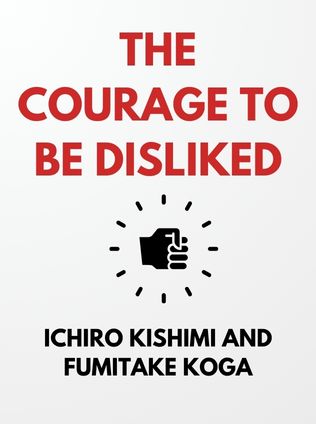
The Courage to Be Disliked
How to Free Yourself, Change your Life and Achieve Real Happiness
By Ichiro Kishimi and Fumitake Koga
Published 12/2013
About the Author
Ichiro Kishimi and Fumitake Koga, the authors of The Courage to Be Disliked, bring forth a profound and transformative perspective on human psychology and happiness. Ichiro Kishimi, a distinguished philosopher and expert in Adlerian psychology, has dedicated his life to exploring the depths of human nature and the intricate dynamics of interpersonal relationships. His philosophical insights, deeply rooted in the teachings of Alfred Adler, offer readers a pathway to personal freedom and self-empowerment.
Fumitake Koga, a celebrated writer, has masterfully co-authored this book with Kishimi, bringing a narrative that is both engaging and enlightening. Together, they have crafted a dialogue that transcends traditional self-help literature, providing readers with a philosophical blueprint for living an authentic and fulfilling life. Their collaboration is a testament to the power of combining philosophical rigor with accessible, relatable storytelling, making complex ideas available to a broad audience.
Main Idea
The central thesis of The Courage to Be Disliked is the assertion that happiness is not something to be found in the approval of others but is instead a personal choice, a state of being that can be cultivated through the "courage to be disliked." The authors argue that most people live their lives trapped by the expectations and judgments of others, leading to a life of perpetual dissatisfaction and unhappiness. By embracing the principles of Adlerian psychology, they suggest that individuals can break free from these societal chains and pursue a life of genuine fulfillment.
At its core, the book is about empowerment. It teaches readers that they are not defined by their past traumas or by the opinions of others, but by the goals they set and the actions they take in the present. By shifting the focus from external validation to internal values, Kishimi and Koga provide a roadmap for living a life that is true to oneself, irrespective of societal pressures or expectations.
Table of Contents
- Introduction: The Courage to Be Disliked
- Adler’s Psychology of Empowerment
- Unhappiness Is a Choice
- You Choose Who You Are
- The Past Cannot Make You Unhappy
- Why Do We Choose to Be Unhappy?
- Unhappy People Aim for External Approval
- Happy People Aim to Help Others
- Happy People Set Boundaries in Their Relationships
- Happy People Live in the Present
- Conclusion: Embracing the Courage to Be Disliked
Introduction: The Courage to Be Disliked
The introduction sets the tone for the book, challenging readers to rethink their understanding of happiness and societal acceptance. The title itself, The Courage to Be Disliked, is a bold statement that encapsulates the essence of the book's philosophy. Kishimi and Koga invite readers to consider the possibility that true happiness comes not from being liked by others, but from living a life true to one's own values and desires. This requires a certain level of courage—a willingness to stand apart from the crowd and face potential disapproval.
The authors assert that many of life's problems are self-imposed, born out of a desire to meet the expectations of others. By shedding the need for external validation, individuals can find freedom and joy in simply being themselves. This concept is rooted in Adlerian psychology, which emphasizes the importance of individual empowerment and self-determination. The introduction serves as a powerful call to action, urging readers to embark on a journey of self-discovery and personal growth.
Adler’s Psychology of Empowerment
Alfred Adler, a prominent figure in the field of psychology, is the intellectual foundation upon which The Courage to Be Disliked is built. Unlike Freud, who focused on the past as the determinant of behavior, Adler emphasized the role of goals and future aspirations in shaping an individual's life. This "teleological" approach to psychology suggests that we are not merely products of our past experiences but are instead driven by our goals and the lifestyle choices we make in pursuit of these goals.
Kishimi and Koga explain that according to Adler, the self is not a fragmented entity but a unified whole. Our thoughts, emotions, and behaviors are all aligned toward achieving the goals we have consciously or unconsciously set for ourselves. This perspective is empowering because it places control firmly in the hands of the individual. We are not victims of our past; we are creators of our future.
"You are not controlled by your past, but by your goals." - Alfred Adler
Sign up for FREE and get access to 1,400+ books summaries.
You May Also Like
The Subtle Art of Not Giving a F*ck
A Counterintuitive Approach to Living a Good Life
By Mark MansonRich Dad Poor Dad
What the Rich Teach Their Kids About Money - That the Poor and Middle Class Do Not!
By Robert T. KiyosakiHow To Win Friends and Influence People
The All-Time Classic Manual Of People Skills
By Dale CarnegieFreakonomics
A Rogue Economist Explores the Hidden Side of Everything
By Steven D. Levitt and Stephen J. Dubner



















